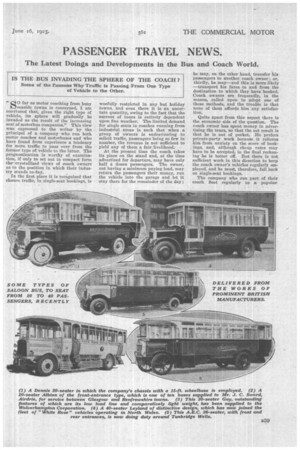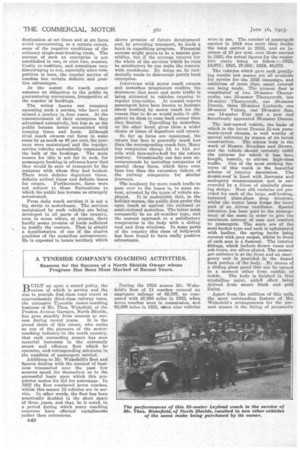PASSENGER TRAVEL NEWS.
Page 23

Page 24

If you've noticed an error in this article please click here to report it so we can fix it.
The Latest Doings and Developments in the Bus and Coach World.
IS THE BUS INVADING THE SPHERE OF THE COACH? Some of the Reasons Why Traffic is Passing From One Type of Vehicle to the Other.
" S0 far as motor coaching from busy seaside towns is concerned. I am convinced that, given the right type of vehicle, its sphere will gradually be invaded as the result of the increasing zeal of motorbus companies?' This view was expressed to the writer by the principal of a company who run both motor coaches and motorbuses and who have found from experience a tendency for more traffic to pass over from the former type of vehicle to the latter. The prognostication is worthy of examination, if only to set out in compact form the crystallized views of coach owners as to the position in which their industry stands to-day.
In the first place it is recognized that chance traffic, in single-seat bookings, is woefully restricted in any but holiday towns, and even there it is an uncertain quantity, owing to the fact that the success of tours is entirely dependent upon fine weather. The limited demand for single seats in coaches running from industrial areas is such that when a group of owners is endeavouring to solicit traffic, passengers being so few in number, the revenue is not sufficient to yield any of them a fair livelihood.
At the present time the coach takes its place on the stand and, at the time advertised for departure, may have only half a dozen passengers. The owner, not having a minimum paying load, may return the passengers their money, run the vehicle into the garage and let it stay there for the remainder of the day ; he may, on the other hand, transfer his passengers to another coach owner ; or, thirdly, he may—and this is more likely —transport his fares to and from the destination to which they have hooked. Coach owners are frequently, in the season, called upon to adopt one of these methods, and the trouble is that none of them affords him any satisfaction.
Quite apart from this aspect there is the economic side of the question. The coach owner has spent money in advertising the tours, so that the net result is that he is out of pocket. He prefers private-party work because it relieves him from anxiety on the score of bookings, and, although cheap rates may have to be accepted, in the final reckoning he is better off. But there is not sufficient work in this direction to keep the coach owner's vehicles regularly employed, and he must, therefore, fall back on single-seat bookings.
The company who run part of their coach fleet regularly to a popular
destination at set times and at sot fares avoid encountering, to a certain extent, some of the negative conditions of the ordinary single-seat-booking trade. The success of math an enterprise is not established in one, or even two, seasons. Costly to institute, and sometimes very discouraging to run, especially when competition is keen, the regular service of coaches has certain definite and positive advantages.
At the outset the coach owner assumes an 'obligation to the public in guaranteeing conveyance, irrespective of the number of bookings.
The writer knows one company operating such a service, who have not missed a journey in four years. At the commencement of their enterprise they advertised extensively, but less so as the public became better acquainted with running times and fares. Although rival coach owners cut fares in some cases by as much as 40 per cent, the journeys were maintained and the regularservice vehicles undoubtedly commanded the bulk of the bookings. The main reason for this is not far to seek, for passengers booking in advance knew that they would be sure of transport by the company with whom they had booked. There were definite departure times. definite arrival times and definite times for return. Furthermore, fares were not subject to those fluctuations to which the public has become so strangely accustomed.
From daily coach services it is not a big stride to motorbuses. The services maintained by such vehicles are being developed in all parts of the country, even in areas where, at present, there. hardly seems promise of loads sufficient to justify the venture. That la simply a manifestation of one of the elusive qualities of the motorbus entrepreneur. He is expected to locate territory which shows promise of future developmenI and, by providing transport, he lends a hand in expediting progress. Financial success might prove to be a remote poeeibility, but if the average returns for the whole of the services which he runs be satisfactory he can make the venture with confidence. By doing so, he incidentally tends to discourage purely local enterprise.
Interviews with motor coach owners and motorbus proprietors confirm the statement that more and more traffic is being attracted to vehicles running to regular time-tables. At coastal resorts passengers have been known to hesitate about booking by motor coach for the reason that to do so would make it obligatory on them to come back sooner than they desired. Travelling by motorbus, on the other hand, gives them a wider choice of times of departure and return.
So far as fares are concerned, the return bus fare is generally much lees than the corresponding coach fare. Many bus companies charge 1d. to 1d. per mile with fareeand-a-half for the return. journey. Occasionally one has seen announcements by motorbus companies of special cheap fares, which have even been less than the excursion tickets of the railway companies for similar journeys.
The tendency for more coach traffic to pass over to the buses is, to some extent, arrested by the types of vehicle em ployed. It is undeniable that, ia the holiday season, the public does prefer the open coach as against the enclosed or semi-enclosed motorbus. The latter must necessarily be an all-weather type, and the nearest approach to a satisfactory compromise is the body with a sliding roof and drop windows. In some parts of the country this claw of bodywork has been found to have really positive advantages.






























